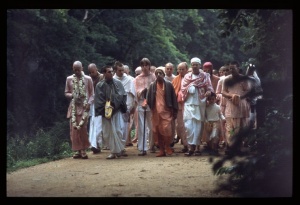SB 7.14.26: Difference between revisions
m (1 revision(s)) |
No edit summary |
||
| Line 1: | Line 1: | ||
{{info | {{info | ||
|speaker= | |speaker=Nārada Muni | ||
|listener=King | |listener=King Yudhiṣṭhira | ||
}} | }} | ||
[[Category:Srimad-Bhagavatam - Canto 07 Chapter 14]] | |||
[[Category:Bhagavatam Verses Spoken by Narada Muni - Vanisource|071426]] | |||
<div style="float:left">'''[[Srimad-Bhagavatam]] - [[SB 7|Seventh Canto]] - [[SB 7.14: Ideal Family Life|Chapter 14: Ideal Family Life]]'''</div> | |||
<div style="float:right">[[File:Go-previous.png|link=SB 7.14.25]] '''[[SB 7.14.25]] - [[SB 7.14.27-28]]''' [[File:Go-next.png|link=SB 7.14.27-28]]</div> | |||
{{RandomImage}} | |||
==== TEXT 26 ==== | ==== TEXT 26 ==== | ||
<div | <div class="verse"> | ||
saṁskāra-kālo jāyāyā | :saṁskāra-kālo jāyāyā | ||
apatyasyātmanas tathā | :apatyasyātmanas tathā | ||
preta-saṁsthā mṛtāhaś ca | :preta-saṁsthā mṛtāhaś ca | ||
karmaṇy abhyudaye nṛpa | :karmaṇy abhyudaye nṛpa | ||
</div> | </div> | ||
| Line 17: | Line 22: | ||
==== SYNONYMS ==== | ==== SYNONYMS ==== | ||
<div | <div class="synonyms"> | ||
saṁskāra- | ''saṁskāra-kālaḥ''—at the proper time indicated for Vedic reformatory performances; ''jāyāyāḥ''—for the wife; ''apatyasya''—for the children; ''ātmanaḥ''—and one's own self; ''tathā''—as well as; ''preta-saṁsthā''—funeral ceremonies; ''mṛta-ahaḥ''—annual death ceremonies; ''ca''—and; ''karmaṇi''—of fruitive activity; ''abhyudaye''—for furtherance; ''nṛpa''—O King. | ||
</div> | </div> | ||
| Line 24: | Line 29: | ||
==== TRANSLATION ==== | ==== TRANSLATION ==== | ||
<div | <div class="translation"> | ||
O King Yudhiṣṭhira, at the time prescribed for reformatory ritualistic ceremonies for one's self, one's wife or one's children, or during funeral ceremonies and annual death ceremonies, one must perform the auspicious ceremonies mentioned above in order to flourish in fruitive activities. | O King Yudhiṣṭhira, at the time prescribed for reformatory ritualistic ceremonies for one's self, one's wife or one's children, or during funeral ceremonies and annual death ceremonies, one must perform the auspicious ceremonies mentioned above in order to flourish in fruitive activities. | ||
</div> | </div> | ||
| Line 31: | Line 36: | ||
==== PURPORT ==== | ==== PURPORT ==== | ||
<div | <div class="purport"> | ||
The Vedas recommend many ritualistic ceremonies to be performed with one's wife, on the birthdays of one's children, or during funeral ceremonies, and there are also personal reformatory methods like initiation. These must be observed according to time and circumstances and the directions of the śāstra. Bhagavad-gītā strongly recommends, jñātvā śāstra-vidhānoktam: everything must be performed as indicated in the śāstras. For Kali-yuga, the śāstras enjoin that saṅkīrtana-yajña be performed always: kīrtanīyaḥ sadā hariḥ ([[CC Adi 17.31]]). All the ritualistic ceremonies recommended in the śāstras must be preceded and followed by saṅkīrtana. This is the recommendation of Śrīla Jīva Gosvāmī. | The ''Vedas'' recommend many ritualistic ceremonies to be performed with one's wife, on the birthdays of one's children, or during funeral ceremonies, and there are also personal reformatory methods like initiation. These must be observed according to time and circumstances and the directions of the ''śāstra''. ''Bhagavad-gītā'' strongly recommends, ''jñātvā śāstra-vidhānoktam'': everything must be performed as indicated in the ''śāstras''. For Kali-yuga, the ''śāstras'' enjoin that ''saṅkīrtana-yajña'' be performed always: ''kīrtanīyaḥ sadā hariḥ'' ([[CC Adi 17.31]]). All the ritualistic ceremonies recommended in the ''śāstras'' must be preceded and followed by ''saṅkīrtana''. This is the recommendation of Śrīla Jīva Gosvāmī. | ||
</div> | </div> | ||
__NOTOC__ | |||
<div style="float:right; clear:both;">[[File:Go-previous.png|link=SB 7.14.25]] '''[[SB 7.14.25]] - [[SB 7.14.27-28]]''' [[File:Go-next.png|link=SB 7.14.27-28]]</div> | |||
__NOTOC__ | |||
__NOEDITSECTION__ | |||
Revision as of 15:05, 17 June 2021

A.C. Bhaktivedanta Swami Prabhupada
TEXT 26
- saṁskāra-kālo jāyāyā
- apatyasyātmanas tathā
- preta-saṁsthā mṛtāhaś ca
- karmaṇy abhyudaye nṛpa
SYNONYMS
saṁskāra-kālaḥ—at the proper time indicated for Vedic reformatory performances; jāyāyāḥ—for the wife; apatyasya—for the children; ātmanaḥ—and one's own self; tathā—as well as; preta-saṁsthā—funeral ceremonies; mṛta-ahaḥ—annual death ceremonies; ca—and; karmaṇi—of fruitive activity; abhyudaye—for furtherance; nṛpa—O King.
TRANSLATION
O King Yudhiṣṭhira, at the time prescribed for reformatory ritualistic ceremonies for one's self, one's wife or one's children, or during funeral ceremonies and annual death ceremonies, one must perform the auspicious ceremonies mentioned above in order to flourish in fruitive activities.
PURPORT
The Vedas recommend many ritualistic ceremonies to be performed with one's wife, on the birthdays of one's children, or during funeral ceremonies, and there are also personal reformatory methods like initiation. These must be observed according to time and circumstances and the directions of the śāstra. Bhagavad-gītā strongly recommends, jñātvā śāstra-vidhānoktam: everything must be performed as indicated in the śāstras. For Kali-yuga, the śāstras enjoin that saṅkīrtana-yajña be performed always: kīrtanīyaḥ sadā hariḥ (CC Adi 17.31). All the ritualistic ceremonies recommended in the śāstras must be preceded and followed by saṅkīrtana. This is the recommendation of Śrīla Jīva Gosvāmī.